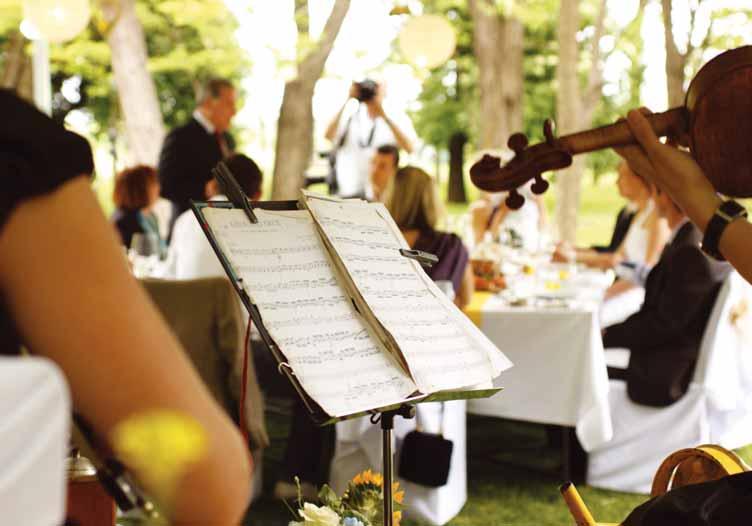
9 minute read
Festivals: Beyond the UK
Successful control of COVID-19 infections means that some countries are allowing large-scale music festivals to go ahead, while others remain cautious. Clare Stevens reports
Left: Kenneth Woods, artistic director of Mahlerfest Photo: Benjamin Ealovega Astonishing though it may seem to UK readers who went straight from Christmas into a long, long spring lockdown, on the other side of the world around 20,000 people are believed to have celebrated New Year in New Zealand by attending the nation’s largest music festival, Rhythm and Vines, in Gisborne on North Island from December 29-31, 2020. Due to New Zealand’s successful handling of the pandemic, ticketholders were not required to wear masks nor socially distance from each other for the festival, which saw performances by Fat Freddy’s Drop, Benee, and BROODS.
On South Island, the Rhythm and Alps Festival marked its tenth anniversary by inviting 10,000 people to ring in 2021 in Wanaka, with sets by Six60, Chaos in the CBD, and Shihad. Northern Bass Festival in Mangawhai, an hour north of Auckland, also celebrated 10 years with a New Year celebration spanning three days and nights. More recently, at the end of March the harbourside in Wellington, North Island was packed for Jim Beam Homegrown, which as the name suggests has always been a Kiwi festival showcasing the finest musical talents that New Zealand has to offer, with more than 50 acts spanning genres and generations on six stages. COVID-19 was not even mentioned on the Information or FAQs pages of the Homegrown website.
The picture is not quite so positive in Australia, where the inaugural Inverted festival of punk and pub rock in Queensland due to take place on 1 May was cancelled at a month’s notice, due to concerns surrounding COVID-19 cases in Brisbane and new government Health Orders impacting people throughout Queensland, as well as those in the Northern Rivers area of New South Wales.
‘The decision has not been made lightly,’ said the organisers, ‘but comes at a time where preparations had commenced to create a festival event for fans, free of zoning restrictions. ‘Inverted Festival was ambitious in size and scale, with a goal to become the largest standing music festival in Australia since the pandemic first hit. Following the recent last-minute Health Order cancellations of similar large events, it’s evident the production of this large-scale event isn’t flexible enough to cope with the current fluctuating COVID status alerts and uncertainty in the community.’
And the Byron Bay Bluesfest in New South Wales (NSW), scheduled for the first week of April, was cancelled with just one day’s notice, according to the NSW health authority, ‘to minimise the risk of the highly infectious COVID-19 variant of concern being transmitted in the local area, as well as across states and territories.’ It added, ‘Infectious Queensland travellers attended a number of venues in the Byron Bay area and the new locally acquired case was infected at one of these venues.’
Smaller-scale events are less risky, however. A semi-staged performance of Purcell’s King Arthur was able to go ahead with soloists, choir and orchestra in the beautiful outdoor quadrangle of St Paul’s College, on the University of Sydney campus in April; and the British pianist Kathryn Stott sincerely hopes to be able to welcome audiences in person to her final programme as artistic director of the Australian Festival of Chamber Music (AFCM) in Townsville 23 July–1 August. While many of the musicians who should have travelled from all over the world to take part cannot now do so, the festival stars more than 40 Australian musicians, 15 in their AFCM debut, as well as three ensembles, and will feature 133 works, 112 composers, four world premieres and five Australian premieres. ‘What a rollercoaster we have all been through with such unimaginable times on a global scale,’ comments Stott. ‘The world of live music became eerily silent for far too long, but I am so excited about an absolute thriller of a festival programme for 2021! I am incredibly proud to bring together such an outstanding group of Australian musicians.’
In Iowa, USA, Des Moines Metro Opera (DMMO) should be taking place as you read this issue of MJ, following the implementation of a detailed plan devised by general and artistic director Michael Egel to deal with the threat from COVID-19.
After adding a COVID Compliance Officer to the team in February, DMMO decided to implement a mandatory vaccination policy for all company


Above left: Kathryn Stott (centre) and colleagues at the Australian Festival of Chamber Music Photo: AFCM Above right: Marlboro Chamber Music festival, Vermont Photo: Pete Checchia members, numbering over 200 and including singers, orchestral musicians, design and production personnel, apprentice artists and administrative staff.
DMMO did not take this decision lightly, but they believe a vaccinated community is the first and baseline mitigation step in ensuring the safety of all and a return to staged performances in July 2021. ‘Vaccination will not be the only mitigation measure, but it will be our most important mitigation step if we all are to sing, work and play together safely,’ says Egel. State Governor Kim Reynolds agreed to make vaccines available through the Iowa Department of Public Health to any company member who was not able to source them in their current location. DMMO covered the costs for all company members to make an early, pre-season visit to Iowa to be vaccinated at least two weeks prior to the start of rehearsals and work.’
Marlboro Music in Vermont has also committed itself to reconvening this year (17 July–15 August) after cancelling in 2020. ‘This winter and spring, we have been working to determine how best to balance our competing goals: to provide our young players with the mentoring, opportunities, and support that Marlboro uniquely provides, with the overriding necessity of protecting their health and that of our senior musicians, staff, and the Marlboro community more broadly,’ said President Christopher Serkin in a letter to supporters in April. Thanks to the roll-out of vaccines, Marlboro has decided that it can safely run coaching sessions and performances; but at the time of writing Serkin was not certain whether open rehearsals or public concerts would be possible.
‘This will depend on the continuing trajectory of the virus and on Vermont regulations concerning the size and conditions of group gatherings. Our program includes singers and woodwind and French horn players who cannot perform while masked, and additional protocols are necessary for them,’ he wrote. ‘While we all yearn for a Marlboro summer like the 69 that took place prior to the pandemic, it gives us great satisfaction to anticipate providing hope and opportunities to our musicians, to ease the loneliness and isolation they have felt, and to make them, once again, feel valued, respected, and supported.’
The Mahlerfest in Boulder, Colorado, whose artistic director is conductor Kenneth Woods, also artistic director of the English Symphony Orchestra, has been moved from May to 24–28 August. ‘Our change of date will allow us to do more in-person activities with larger orchestras and audiences,’ says Woods. ‘We will be sure to follow all COVID-19 regulations and guidelines and are working with venues now to plan for the biggest and best festival possible.
‘Mahler’s Fifth Symphony will be the highlight of the season, along with the world premiere of Philip Sawyers’ Symphony No. 5. Sawyers was scheduled to be our visiting composer in 2020. His fifth symphony, another fifth in five movements, was written during the pandemic. We will also host our usual symposium, chamber music concerts, and hopefully a visit to Mount Mahler, since August is a better month to do that than May.’
Support from sponsors has helped festivals to survive the cancellations in 2020 and plan for this year. Salzburg Festival in Austria has acknowledged its gratitude to corporate sponsors including Audi, Siemens and Rolex, plus new global sponsor BWT, for keeping faith with the institution in these difficult times. All being well, the summer festival will take place in the city 17 July–31 August.
Pierre Audi, artistic director of the Aix-en-Provence Festival in the south of France (30 June- 25 July), is equally determined that his event will go ahead. There will be eight new opera productions and a concert version of one opera, covering a wide range of eras and styles, from Monteverdi, Cavalli and Rossi to contemporary creations, and the festival’s usual ambitious programme of concerts and education projects. Special measures to protect the health of all members of the public, the artists and the festival staff will be put in place; for example, before each performance, ticketholders will receive the information necessary to facilitate their reception
at the performance venue, including a suggested time of arrival, any requirements for wearing a mask, the organisation of intervals, and so on.
‘Since the cancellation of last year’s festival, replaced by #THEDIGITALSTAGE, we have expanded our ambitions for its 2021 edition, which we hope will be exceptional,’ says Audi. ‘We all have an urgent need to enjoy beauty and art together, live, in the present—even though we do not yet know what tomorrow will bring.’
Elsewhere in the world, the Cape Town International Jazz Festival (CTIJF) in South Africa, already postponed from March 2020, announced last December that with the country experiencing a second wave of COVID-19, the impact of which was likely to be felt ‘deep into 2021’, further postponement until 2022 was felt to be essential. ‘While the road to CTIJF2022 will be a long one’, said the festival’s letter to sponsors and ticketholders, ‘it will not be without the joy and nostalgia jazz music brings. We have been working hard behind the scenes to bring you a brand new series of online events and smaller live jazz experiences throughout 2021.’ These will be presented under the banner ‘Jazzfix’.
However, the Rocking the Daisies Festivals, which take place in Cape Town and Johannesburg later in the year (1–3 October), were set to go ahead at the time of writing. And the One Africa Musicfest in Dubai is still scheduled for 26 November. The Abu Dhabi Festival is maximising the use of digital technology to ensure that its 2021 performances can go ahead on various dates throughout the year, with the theme ‘The future starts now’. In South America, Colombia’s Festival Estério Picnic has been moved from April this year to September, while in Chile, the organisers of Lollapalooza are still hoping their festival can take place at the end of November.
In Japan, the Fuji Rock Festival is planning a ‘special Fuji Rock under special circumstances’ at Naeba Ski Resort, 20–22 August, implementing heightened health and safety measures to prevent the spread of COVID-19 so everyone can enjoy the festival in a safe and secure environment. ‘We believe that with everyone’s cooperation and through respect and compassion for each other we can create a safe and secure space together,’ says their statement. ‘We will move forward as one to hold this year’s festival … with the belief that the future of outdoor festivals is bright. NO FESTIVAL, NO LIFE.’
Below: Marlboro Music Festival, Vermont Photo: Allen Cohen










